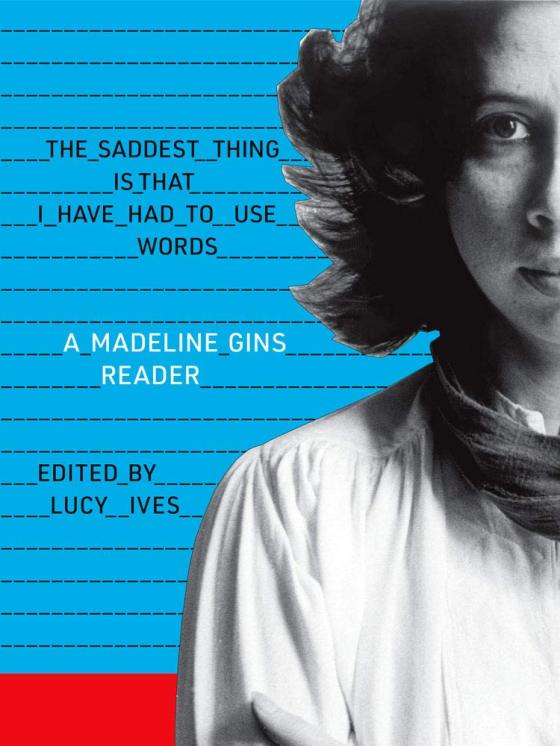
著者:マドリン・ギンズ
編集:Lucy Ives
出版社: Siglio press
発売日:2020年4月21日
言語: 英語
サイズ: 15.2 x 20.3 cm・ソフトカバー
ISBN-10: 1938221249
ISBN-13: 978-1-938221-24-8
Poet, philosopher, speculative architect and transdisciplinary artist, Madeline Gins (1941–2014) is well-known for her collaborations with her husband, the artist Arakawa, on the experimental architectural project Reversible Destiny, in which they sought to arrest mortality by transforming the built environment. Yet, her own writings—in the form of poetry, essays, experimental prose, and philosophical inquiries—represent her most visionary and transformative work. Expansive and playful, Gins’s vigorous and often ecstatic exploration of the physicality of language challenges us to sense more acutely the ways in which we can—and could—write and read. Like Gertrude Stein before her, Gins transfigures grammar and liberates words. Like her contemporaries in conceptual art, her writing is attuned to the energized, collaborative space between reader and page. She invites the reader into a field of infinite, ever-multiplying possibility.
The Saddest Thing Is That I Have Had to Use Words: A Madeline Gins Reader is a revelatory anthology, edited and with an introduction by the writer and critic Lucy Ives. It brings never-before-published poems and essays together with a complete facsimile reproduction of Gins’s 1969 masterpiece, WORD RAIN (or A Discursive Introduction to the Intimate Philosophical Investigations of G,R,E,T,A, G,A,R,B,O, It Says), along with substantial excerpts from her two later books What the President Will Say and Do!! (1984) and Helen Keller or Arakawa (1994). Long out of print or unpublished, Gins’s poems and prose form a powerful corpus of experimental literature, one which is sure to upend existing narratives of American poetics at the close of the twentieth century.
ABOUT MADELINE GINS
Poet and novelist, artist, philosopher, and speculative architect, Madeline Gins was born in the Bronx, NY in 1941. She grew up on Long Island, and graduated from Barnard College in 1962, having studied physics and philosophy. The author of three full-length collections of writing, Gins also collaborated with her husband Arakawa on a theory of “procedural architecture,” an endeavor to create buildings and environments that would prevent human death. Arakawa + Gins’s Reversible Destiny project realized five built works in the United States and Japan, and before her death in 2014, Gins independently completed a staircase in the Dover Street Market in New York City for Rei Kawakubo of Comme des Garçons. Long a resident of New York City, Gins participated in experimental artistic and literary movements of the 1960s and ’70s before developing a collaborative practice as a philosopher and architect. She leaves a rich and complex legacy of interdisciplinary thought, action, and writing: although much of her work was unpublished or went out of print in her own lifetime, her prescient efforts in poetics, aesthetics, and environmental studies are central to contemporary debates about how to form communities and create collaboratively and sustainably.
ABOUT THE EDITOR
LUCY IVES is the author of two novels, Impossible Views of the World (Penguin Press, 2017) and Loudermilk: Or, The Real Poet; Or, The Origin of the World (Soft Skull Press, 2019). Her writing has appeared in Art in America, Artforum, frieze, Granta, and Vogue, among other publications. She holds a Ph.D. in comparative literature from New York University and received a 2018 Creative Capital | Andy Warhol Foundation Arts Writers Grant. A collection of her short stories is forthcoming from Soft Skull Press in early 2021.
More advance praise:
PAUL CHAN: “Madeline Gins was marooned here, on Earth, and made the best of it, using what was available to her, like words. This book is a splendid testament to how far she pushed them, and us, to realize what she already knew. That this, all this, is not it. Not. Even. Close.”
JOHANNA DRUCKER: “Gins was a foundational figure. Her work was original and yet also deeply indicative of the transformative activities of conceptualism that performed a tectonic shift in art-making beginning in the late 1960s. These brilliant essays, the incredible novel/artist’s book WORD RAIN, the poems, projects, and thoughts have all been scattered, unavailable, or out of print. Ives frames the collection articulately, giving us a vivid sense of the period in which Gins began and developed her remarkable body of work. This is a welcome publication that will renew our appreciation of Gins’s intellect and wit.”
